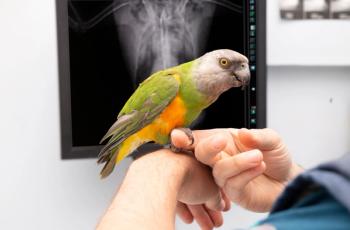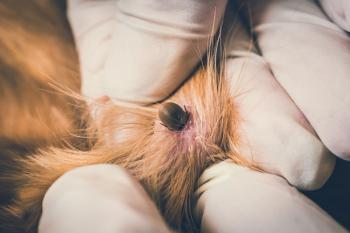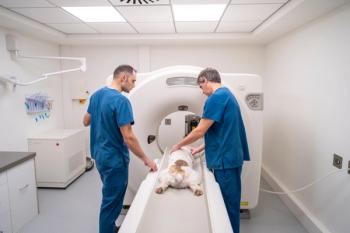
Hot Literature: Is she or isn't she? Easy pregnancy testing for queens
A recently published study evaluated the use of a commercially available point-of-care relaxin test for its sensitivity and specificity for pregnancy detection in cats.
Knowing the reproductive status of queens-not only for pregnancy diagnosis, but also for managing breeding cat colonies or as a screening tool before administering medications or performing various procedures-is a clinical necessity. Current methods for diagnosing pregnancy in cats include palpation, radiography, ultrasonography, and some laboratory testing. While ultrasonography remains a highly sensitive method for detecting pregnancy in queens, it requires expensive equipment, training, and a relatively cooperative patient to perform.
A recently published study evaluated the use of a commercially available point-of-care relaxin test for its sensitivity and specificity for pregnancy detection in cats. The test (Witness Relaxin-Synbiotics), designed for pregnancy detection in bitches, requires only two drops of serum or plasma, and positive results are indicated by the development of a pink or purple line along the test strip (similar to human pregnancy tests). This study sought to determine the specificity and sensitivity of this simple test when used in cats and the earliest gestational day that relaxin is detectible.
For this study, 24 queens from a breeding colony, 128 stray queens undergoing ovariohysterectomy, and 10 ovariohysterectomized cats were evaluated. Daily blood samples were collected and tested using the test kit. For pregnant cats, the gestational days were determined by either counting backward from parturition or by fetal crown-rump measurements. Only queens identified as healthy (based on physical examination and medical history) and between the ages of 1 and 8 years were included in the study. Queens in the breeding colony were housed with toms and monitored for pregnancy through palpation performed by an experienced researcher. Relaxin testing began two to three weeks after inclusion of the tom. The queens were then tested daily until two consecutive positive test results were obtained, and then testing continued once a week. Daily testing was discontinued after three weeks for queens that did not become pregnant. Additional samples were collected and tested after parturition once daily until a negative result was obtained. Pregnant stray or feral queens (pregnancy diagnosed based on gross examination of reproductive parts and fetuses) undergoing ovariohysterectomy were tested at the time of surgery. Additionally, a blood sample was collected from 10 cats known to have already undergone an ovariohysterectomy.
Results of the study showed that at day 29 of gestation, the test's sensitivity was 100%, and its overall specificity was 95.9%. Three nonpregnant cats had positive test results, but two of them were found to have large ovarian cysts, which may have been producing relaxin. Before day 29, there were some positive results, but the sensitivity decreased. After parturition, test results were negative within 24 to 48 hours (one cat had a positive result for four days after parturition).
The findings of this study suggest that this commercially available test kit can successfully diagnose pregnancy in queens and may be an inexpensive, fast, and simple alternative in some cases. The researchers note that when breeding dates are known, this test is a convenient and highly predictive means for detecting pregnancy. However, interpretation of results for cats with an unknown breeding history may be more complicated.
DiGangi BA, Griffin B, Levy JK, et al. Use of a commercially available relaxin test for detection of pregnancy in cats. J Am Vet Med Assoc 2010;237(11):1267-1274.
Link to abstract:
Newsletter
From exam room tips to practice management insights, get trusted veterinary news delivered straight to your inbox—subscribe to dvm360.




